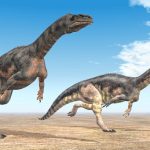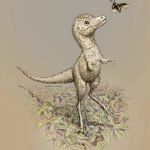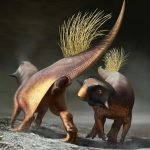Scientists discover winged sharks in the Cretaceous seas
93 million years ago, bizarre, winged sharks swam in the waters of the Gulf of Mexico.
This newly described fossil species, called Aquilolamna milarcae, has...
Dinosaurs took 15 million years to get from South America to Greenland
A snail could have crawled its way faster.
10,000 kilometers (6,213 miles) over 15 million years—that’s how long it took the first herbivorous dinosaurs to...
Scientists find surprising history of world’s largest lizard
The unusual breeding history of the Earth's largest living lizard - the Komodo dragon - has been laid bare in a new study from...
Scientists close the case of what killed the dinosaurs
Researchers believe they have closed the case of what killed the dinosaurs.
They definitively links dinosaur extinction with an asteroid that slammed into Earth 66...
Scientists explain the cataclysm that killed the dinosaurs
It was tens of miles wide and forever changed history when it crashed into Earth about 66 million years ago.
The Chicxulub impactor, as it’s...
Did a comet wipe out the dinosaurs?
About 66 million years ago a massive chunk of rock slammed into Earth in what is the modern-day Yucatan Peninsula.
The impact extinguished about 75%...
What killed the dinosaurs and where did it come from?
It forever changed history when it crashed into Earth about 66 million years ago.
The Chicxulub impactor, as it's known, left behind a crater off...
To figure out how dinosaurs walked, start with how they didn’t
Paleontologists have made great strides in understanding how extinct animals like dinosaurs walked, ran, swam and flew when they were alive—but much about the...
Baby tyrannosaurs were only the size of a Border Collie dog, shows study
They are among the largest predators ever to walk the Earth, but experts have discovered that some baby tyrannosaurs were only the size of...
Scientists reconstruct all-purpose dinosaur opening for the first time
For the first time ever, a team of scientists, led by the University of Bristol, have described in detail a dinosaur's cloacal or vent...










